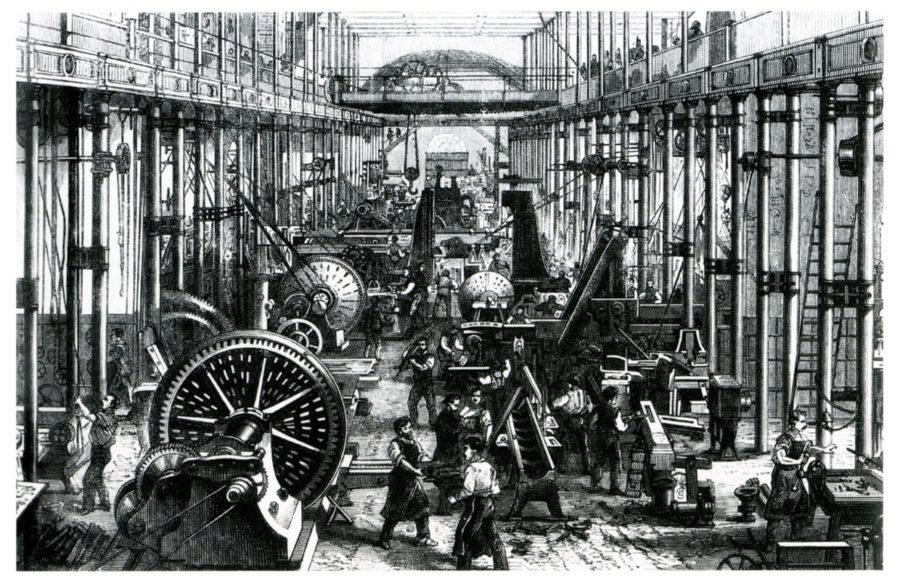Britain’s Industrial Revolution took place between 1760 and 1840. Roughly. There’s no hard start or end date, just a slow build up in the years prior to 1760 before things exploded. It is considered to be one of the most important periods in history because of the changes that occurred in a relatively short time frame and the huge impact it had on the fabric of society.
In the early 1700’s, Britain experienced several things that made the Industrial Revolution possible. Advances in farming led to an increase in food supply and between 1760 and 1820 the population doubled from 6 to 12 million. An abundance of capital, brought about by exploration and trade, and of labour, through an increased population, combined with a surfeit of raw materials, freed up large amounts of people to work in industry.
And as people migrated from the countryside to the cities, the demand for goods, be it cloth or iron, became huge. Industry could not keep up. Consequently, the creative spirit began working overtime trying to discover ways in which to speed up the process of virtually every aspect of manufacturing.

Canals and railroads were built at warp speed to transport goods. Richard Arkwright invented the spinning frame which harnessed the power of water to operate it and James Hargreaves invented the spinning jenny (above) which revolutionized the process of spinning cotton…one operator could spin eight threads instead of one. It was one of the machines that helped launch the Industrial Revolution.
Hargreaves made a number of his machines and started to sell them, but in 1768 a group of spinners broke into his home and destroyed them all. At this point Hargreaves located to Nottingham which was becoming the centre of the cloth producing industry, where he set up his own small cotton mill using his own invention.
But such an act on behalf of the spinners was the precursor to what came much later, in 1811, by a group of people who became known as the Luddites. At this time a group of Nottingham weavers began smashing machinery and burning mills to the tune of 200 a month. After five to six months of this the government stepped in, dispatched around 14,000 soldiers to deal with the problem, and made machine smashing punishable by death.

Today the term Luddite has become synonymous with anyone who dislikes, fears or refuses to understand technology…the technophobes of the world. But as many a historian points out, this isn’t quite the right usage of the word. The Luddites were not fearful of, or angry at, modern machinery. They were fighting for fair wages and worker’s rights. They were a well organized group trying to protect their livelihoods while railing against the fact that machines did a worse job for cheaper and subsequently made obsolete the craft that they had spent many years refining.
After trying unsuccessfully to negotiate with factory owners, who weren’t terribly co-operative, they turned to what one historian stated as “collective bargaining by riot.” They were, in essence a precursor to modern labour unions, objecting to the capitalists treating them in such a way that it de-humanised them and fighting for fair wages and decent factory conditions.

Things ended badly for the Luddites with the government rather brutally crushing their fight and yet what they feared actually came to pass over the next few years as the horrific working conditions of the Industrial Revolution took centre stage. But there is an even more relevant issue at hand here, for at its core this was a fight to make sure that capitalists would fairly distribute their profit. Sound familiar? Several hundred years on and the problem hasn’t gone away.
But what, I hear you asking, does any of this have to do with the PS4? Not much, really other than this. As a kid in school, roughly 10 years old or so, I remember learning about the smashing of the spinning jennys and in my tidy, black and white 10 year old world I was profoundly baffled by the destruction of an object that was designed to make life easier or better in some way.
Today I get it. Utterly and completely. My deepest compassion lies with the Luddites and while the parallel may not be entirely appropriate, I consider my son’s PS4 to be my own personal spinning jenny. I want to take a sledgehammer to it on a daily basis. I want to obliterate it into a million pieces. It has been the cause of endless arguments, debates and negotiating sessions. It is a distraction of immense proportions…a big, black rabbit hole that a teenage boy will fall down and never be heard from again.
But there’s another problem. Take it away and Hydra style, something else rises to take its place…a long since abandoned hand-held electronic game. Or the phone (which, quite frankly, operates as nothing more than a portable gaming station.) And then there’s the small (but hugely inconvenient) issue of all homework now being done on line. Try and take away a laptop and suddenly there is a test to be studied for or a project to be completed. Where, oh where, are the textbooks of old?
So, yes, my grown up empathy lies squarely with the Luddites. I feel their pain and share their fears. Because today we are living through the Technological Revolution and in the face of a rapidly changing world I yearn to start my own fight to protect and improve the working conditions of the modern day parent.
And if you haven’t seen the cult classic movie Office Space starring Ron Livingstone and Jennifer Aniston, you should. Not only is it hilarious but it has the machine smashing scenario of my dreams.

